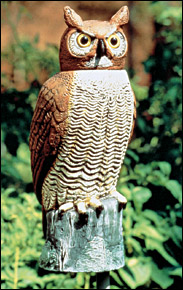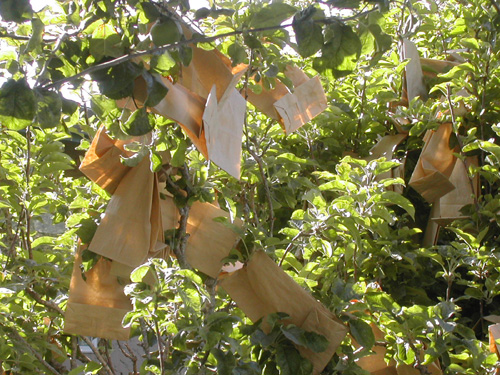Even though August has barely started, it turns out that the Free-Ride offspring have already been to quite a number of museums and related centers of edutainment this summer. We review the line-up:
Category Archives: Kids and science
Fun with paper chromatography.

During one of our recent visits to The Tech Museum, we ran across a fun hands-on activity. The pretty purplish circle pictured here is what the younger Free-Ride offspring produced in this activity.
The kids thought they were just doing an art project. But there’s science in that art.
The art project works using the same principles as a time-honored separation technique called paper chromatography. In this post, I’ll lay out some ways you can play with paper chromatography at home, and I’ll point you toward the scientific principles at work underlying the behavior of the materials you’ll be playing with.
Friday Sprog Blogging: hear hear!
Dr. Free-Ride: What do you guys want to discuss this afternoon?
Younger offspring: The human body.
Elder offspring: Yeah, how the human body works.
Dr. Free-Ride: Um, you guys know that “how the human body works” is a huge subject that we will never get through before dinner, right? You’re going to have to settle on a particular system or body part.
Younger offspring: The skeleton!
Elder offspring: The ear!
Dr. Free-Ride: Is there any room for compromise here?
Elder offspring: Well, the ear contains the smallest bone in the body.
Younger offspring: If it has a bone, I agree to the ear.
Dr. Free-Ride: Thank goodness!
Online source for hands-on chemistry (for kids).
Since Sandra has posted links to sites with brainy games for kids*, and Karmen is working on her list of science education web sites for children, I thought I’d mention one of my favorite online destinations for kid-strength chemistry. Luddite that I am, what I like best is that the site isn’t hypnotizing your child with a virtual chemistry experiment, but actually gives you activities to do with the child in the three-dimensional world.
Friday Sprog Blogging: scare-owls.

Elder offspring: Owls in zoos are kind of weird.
Dr. Free-Ride: How do you mean?
Elder offspring: Well, owls are nocturnal, but zoos are usually just open during the day.
Dr. Free-Ride: Hmm, so either the owls are sleeping, or they’re awake but they’re not too happy about it?
Elder offspring: Yeah.
Dr. Free-Ride: I guess it’s possible that they adjust to a diurnal schedule in the zoo so they don’t miss their meals. And I bet a lot of the sleeping ones get woken up by people walking by their enclosures saying, “Whoo! Whoo!”
Elder offspring: Who would say “Whoo! Whoo!” to a sleeping owl?
Younger offspring: I would. I said “Whoo! Whoo!” to the sleeping owl we saw at Turtle Bay.
Elder offspring: (with an eye roll) That figures.
* * * * *
Friday Sprog Blogging: field trip to the Exploratorium.
The evening before the Free-Ride offspring went with their day-camp on a field trip to the Exploratorium:
Dr. Free-Ride: Do you want to look at the Exploratorium website tonight to get an idea what you might see on the field trip tomorrow?
Elder offspring: No.
Dr. Free-Ride: Why not?
Elder offspring: I think field trips are more fun when I don’t really remember the place we’re going. That way, it’s more of a surprise when we get there.
Dr. Free-Ride: Oh.
Younger offspring: The Exploratorium will be the most fun for me, because I’ve never been there so I can’t remember any of it!
Dr. Free-Ride: Hard to argue with that!
* * * * *
Friday Sprog Blogging: pest management.

Are our friends growing paper bags? (If so, could some clever grafting set them up so they could grow the lunches right in the bags?)
Probably not.
Friday Sprog Blogging: wild animal sightings.
While claims of the Free-Ride offspring’s telepathy are in doubt, there is no question of the younger offspring’s telephonic prowess (which is to say, the younger offspring can remember all the digits necessary and sufficient to place a call to either parents or grandparents with no adult assistance; the long distance carrier is thrilled). This telephonic prowess was lately deployed while the sprogs were staying with the Grandparents Who Lurk But Seldom Comment.
Dr. Free-Ride: (answering the phone) Hello?
Younger offspring: Hello!
Dr. Free-Ride: Hey, what are you guys up to?
Younger offspring: I wanted to tell you that we went to the Wild Animal Park.
Dr. Free-Ride: Cool! Did you see any wild animals?
Younger offspring: Of course we did! It was a wild animal park!
Birth order, familial environment, and ‘intelligence’.
There’s another piece in the New York Times today about how birth order and family dynamics might play a role in “intelligence” (as measured by IQ — an imperfect measure at best). This is a follow up to their earlier story about research reported in Science and Intelligence that claims, based on research on male Norwegian conscripts, that “social rank” in a family accounts for a “small but significant” difference in IQ scores. (Zuska reminds us of the dangers of drawing too strong conclusions from limited data.)
Today’s Times piece seems to be a round-up of anecdata of the sort that readers would find engaging as they quaff their coffee. However, I think the anecdata suggest ways that the system under study is complicated.
And while we’re admitting you to college, let’s throw in the Ph.D. program too!
Another article from Inside Higher Ed that caught my eye:
The chancellor of the City University of New York [Matthew Goldstein] floated a unique approach this week to dealing with the long lamented problem of low enrollments in the sciences: Offer promising students conditional acceptances to top Ph.D. programs in science, technology, engineering and math (the so-called STEM fields) as they start college. …
In a speech Monday, Goldstein envisioned a national effort in which students identified for their aptitude in middle school would subsequently benefit from academic enrichment programs that their own local high schools might not be able to provide (The chancellor described the proposed program as one that could have a particularly strong impact on increasing woefully low minority enrollments in the STEM fields).
Upon entering college, students would be offered a spot in a top Ph.D. science or math program, provided they meet certain performance requirements throughout their undergraduate years.
“It sends a very strong statement to students who have not necessarily had the encouragement … that very elite places genuinely believe in them and, at an early age, they are prepared to make an investment to serve as an incentive for those students to continue to do very good work,” Goldstein said.
Some of my initial reactions to this proposal:
